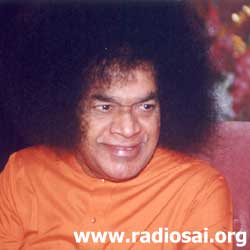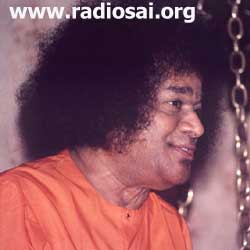ON SLOWING THE MIND FOR MEDITATION
 H: (HISLOP):The Buddha's way of slowing down the mind is given much attention in Burma. Swami must have a better way? H: (HISLOP):The Buddha's way of slowing down the mind is given much attention in Burma. Swami must have a better way?
SAI: The Buddha's way of watching the breath as it
enters and leaves the nostrils is just a beginning, just for a few
minutes before the meditation begins. There is no 'better' way
to quiet the mind. There is only one way. Sitting in meditation,
the question often comes up, 'How long to sit?' There is no
answer. There is no particular time. Meditation is really an
all-day-long process. The sun shines and the sunlight falls here
and there. What is the difference between the sun and the
sunlight?
H: There is no difference, Swami.
SAI: In the same way, all is God - thoughts, desires, all are God. All thoughts should be regarded as God.
H: But Swami, there is still the puzzle of how to slow down the activity of the mind
SAI: Really, there is no mind; it is a question of what is desired. With God as the only desire, all will be well.
H: But in meditation there is this fast rush of thoughts and ideas through the mind. Does not this need to be slowed down so that there may be quiet in meditation?
SAI: Yes. The mind must slow down. At a certain stage it will come to a stop. If desire in meditation is turned towards union with God, the mind will naturally slow down. No method should be used; no force used. Desire should not be too fast, too strong. Even desire for God can be too hurried, too feverish. Start early, drive slowly, reach safely. It is possible to be too lazy. Fast, then slow is also bad. The process should be steady.
 ON THE ORIGIN OF THOUGHTS ON THE ORIGIN OF THOUGHTS
H:These thoughts that stream through the mind, are they material?
SAI:Yes, they are matter. All matter is impermanent.
H: Where do thoughts come from?
SAI:They come from food and environment. If you
have sathwic food and have only desire for good, only good
thoughts will come.
H: Where do thoughts go?
SAI: They go no place. Because thoughts do not flow through the mind. The mind goes out and grasps and gets engaged in thoughts. If desire is for God, the mind does not go out. But the best way is not to have the problem of getting rid of thoughts. The best way is to see all thoughts as God. Then only God-thoughts will come.
ON THE POWER OF THE MIND
H: Swami says that it is the Atma that is unlimited power,
yet in one's daily life, the mind gives the experience of being a
sort of relentless power.
SAI: The mind is passive, yet it seems to be active. It
is active only because the Atma (Self) reflects into it. It sometimes
seems to be stronger than Atma. Iron, in its nature, is not hot;
it is cool and passive.
The iron is heated in fire. Is it the iron
that burns, thus creating the heat? No, it is the heat that is put
into the iron by the burning coals. Th e heat is added to the
iron. Yet, when hot, the iron seems even hotter than the burning
coals. e heat is added to the
iron. Yet, when hot, the iron seems even hotter than the burning
coals.
H: The mind has the tendency to plan ahead. No doubt this is a wrong activity?
SAI: In ordinary life, one makes plans and carries them out. This has to continue, with purity, and without harm to others. At length, a spontaneous divine thought will arise without planning. Such divine impulses will continue.
ON DISCERNING RIGHT THOUGHT
A Visitor: How can I tell what is right thought?
SAI: Here, in the Ashram, you can ask Swami. In America, pray for the answer, then make inquiry in an impersonal way, and in half an hour you will have the answer.If you know what is right, don't ask. Do it. That is confidence, God power. Put aside all relationships. Is the work right, regardless of who is involved?
H: Swami says to keep a distance from the mind. What does that mean?
SAI: That means do not be led by the mind.
H: What are the acceptable mental functions?
SAI: First, find out what is right and what is wrong. If right, do that which satisfies you. If unsure, do nothing until sure.
 ON VEDANTHA ON VEDANTHA
H: Swami mentions Vedanta. What is the correct use of that word?
SAI: Vedanta is metaphysical inquiry of the divine, the world, and the valid experience of each. Metaphysics begins where physics ends. Vedanta proves by experience that which has been formulated. Philosophy is the fruit which has all the parts, whereas Vedanta is the sweet juice. Philosophy takes you to the edge of truth, gives you a vision of truth. Vedanta takes you into the heart of truth. Philosophy is a way of intellectual inquiry.
ON SWAMI, THE WORLD AND THE INDIVIDUAL
H: Swami speaks of the divine, the world and the individual. What is the relationship of Swami to the individual?
SAI: Swami is the activator of the individual. He is the I, the Self in you and in everyone else. The Sun is reflected in the water, and the water becomes warm. Yet, warmth is not in water's nature.
H: What is the difference between God and the World?
SAI: Only in words, in the mind, is there a difference. When one is fully devoted to God, desiring Him only, the verbal and conceptual differentiation will cease, and the world also will be seen as God. The sequence should be experienced and seen as God, life, world. But most people see the world, life - and God is far distant.
 ON THE REASON FOR CREATION ON THE REASON FOR CREATION
A Visitor: Why is creation? What is the reason for it?
SAI: First ask, 'Why food?' No reason. 'Why marriage?'
No reason. Then children. 'Why children?' No reason. It is your
wish. Creation is God's wish, His Sankalpa. There is a seed of a
tree. It sprouts and there are many twigs and branches - and more
and more. Thousands of leaves grow, and hundreds of fruits.
Diversity - all from a single seed.
Visitor: But what is behind creation? What is the reason?
SAI: First ask, 'Who are you?
Visitor: I am a nobody.
SAI: No. No. Who are you? First find that and then you will find the answer to your question.
Visitor: Is there life on other planets?
SAI: Creation is endless.
H: Is it that man creates his world by projecting concepts? For example: 'table' is not real. It is the wood that forms the table that is real, yet we accept the concept 'table' as being real, and we act according to that concept. SAI: Table is wood, and 'table' is a projection of the human mind, and 'table' is only temporary. But the image in the mind is in the nature of an archetype. Likewise castles in clouds are passing phenomena, but God is their base. Just as waves, spray, and bubbles arising from the ocean fall away and
disappear, but the ocean does not disappear.
H: Swami once said that the world emerges outward from man, just as human beings e merge outward from the body of a mother. Does this mean the entire world of which we are aware, everything? merge outward from the body of a mother. Does this mean the entire world of which we are aware, everything?
ON THE EGO: ITS FORMATION AND DISSOLUTION
SAI: There is one exception. There is one thing that comes into man from the outside. That thing is the ego which is formed by attachment to outside objects. With desire for the world cut, ego automatically vanishes. Impressions that are taken into man from outside, if taken as the reality, are harmful. Because man looks at something outside and then creates, he thinks he is reproducing the outside. Whereas, in fact, the outside thing seen merely recalls to memory that which is already within.
When the eyes are open, one sees creation. All beings are created by the help of the eyes. The source of all that you see is the eyes. All so seen is impermanent. The three letters in 'eye' represent the three gunas. But with 'I', the Self, one can see something quite beyond the transient.
(To be continued)....
- Heart2Heart Team
|








 ON THE REASON FOR CREATION
ON THE REASON FOR CREATION